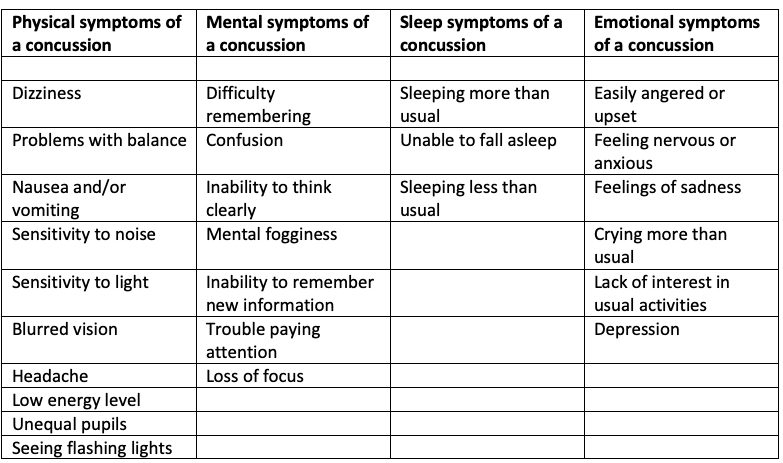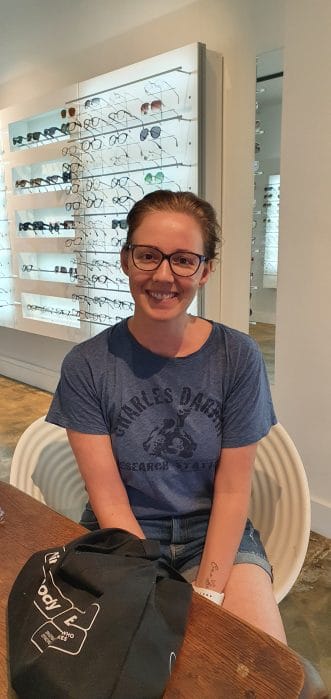
If you experience a concussion, there is a chance that it will affect your vision at least temporarily.
This blog post provides all the information needed to determine whether you have any symptoms of a concussion, mild concussion or interruption with vision. If this applies to you, it is suggested to visit a doctor and optometrist.
A Concussion or Traumatic Brain Injury (TBI) or Acquired Brain Injury causes damage to the brain as a result of a blow to the head, stroke or neurological dysfunction. It changes the way the brain functions.
In children, the most common cause of concussions is a blow to the head during sports. In adults, motor vehicle accidents and falls are the most common cause.
The most common symptoms of a concussion are physical and cognitive:
- Physical: are headaches, dizziness and vision problems
- Cognitive (mental): feeling in a fog and difficulty concentrating are widely experienced.
Recently, we had a patient come through the practice who experienced a severe concussion and it has been over 6 months since the accident. We were able to speak to her about her experience with ACO and how her progress is going.
TELL US ABOUT YOURSELF
Hi my name is Jordana. I am 35 years old, a writer, and married with 3 cats.
HOW DID YOU GET INJURED?
I was in a mountain biking accident 5 and a half months ago, and received a head injury.
HOW DID THE CONCUSSION AFFECT YOU?
It affected me quite a lot. Symptoms included: Visual impairment, couldn’t read, couldn’t focus/concentrate, double vision, headaches, frustration, autonomic dysfunction, static intolerance, light, sound sensitivity, speech problems, vertigo and so on. It has been a long road to recovery so far.
TELL US HOW ACO/PAUL WAS ABLE TO HELP?
Paul was very encouraging and patient from day 1. The first thing he did was identify the problem. He had experienced something similar in his past so he could relate to my symptoms and what I was going through. He understood the situation better and how to try to fix it.
The exercises we did were really effective in waking up the eye and also keeping track of progress each session. There were also exercises I could to do daily at home, and the consistency helped.
One of the exercises involved the fixation of the eye since I was dealing with eye shakiness and it improved the stabilisation of the eye teaming.
IS THERE ANYTHING THAT SURPRISED YOU?
I was surprised at the technology available to help with my situation! One example is the Visual Field Test which was conducted to confirm whether I would be able to drive.
This gave me the confidence to drive again when I was feeling uncertain. The baseball game was also very useful for me and my progress.
HOW DID THE VISION REHAB ASSIST YOU IN THE RECOVERY?
Overall, they made everything easier for me. Right after the crash, I was practically unable to do anything, including watching tv or reading.
They would do everything for me including looking at emails, writing messages etc. It was a comfortable experience whilst I was in a vulnerable state.
EXTRACT from ACO Neurovision:
Following a concussion, there is often an interruption in communication between the eyes and the brain. Studies show that at least 50 percent of TBI patients suffer from visual dysfunctions, with one such study finding a 90 percent incidence of post-trauma visual complications.
Visual problems, however, are often overlooked during initial evaluation as symptoms may not be present until days, weeks or even months following the incident.
A regular eye exam often does not reveal the extent that the visual process is affected from a concussive injury. Patients may be informed that their eyes appear to be healthy and they are seeing clearly, however, more extensive visual processes in the brain may be affected, known as Post Trauma Vision Syndrome (PTVS).
Some symptoms may only last a few seconds while others can linger for months, or even years.
Here’s an example of the cutting-edge technology that Adelaide City Optometrist uses to measure eye movement following a concussion.
Common Vision Problems/Symptoms Following a Concussion
Sensitivity to Motion
This includes discomfort and dizziness when scrolling on a computer screen or phone, or when in busy environments, such as supermarkets.
Difficulty with Eye Movements
It is important in the reading process, as well as tracking moving objects with the eyes, like a ball.
Eye Pain and Headaches
Pain and headaches are a serious symptom following concussion and should never be ignored.
Dizziness and Balance
Dizziness and changes in balance often result from a concussion, along with other related symptoms.
Sensitivity to Light and Inability to Tolerate Glare
Recent studies have suggested that the sun and LCD screens can be particularly bothersome.
Blurry Vision
A common symptom following concussion, blurry vision in everyday life should be attended to and examined by an optometrist.
Binocular Vision Problems
Double vision and convergence insufficiency can cause dizziness and reading difficulty.
Accommodative insufficiency is a reduced ability for the eyes to focus at near. This may cause constant or intermittent blurred vision when reading or working on a computer.
Reduced Visual Processing Speed and Reaction Time
Slower speed in processing visual information can cause problems with judging distance of a ball and movement of players in the sporting field.
Peripheral Vision Problems
Reduced awareness of objects in peripheral vision, being startled by things appearing from the side.
Dry eye
It is common to see the blink rate reduced leading to dry eyes and blurred vision.
Is a Brain injury or Concussion affecting your vision? What to Do:
Visual deficits related to a traumatic brain injury should be evaluated by an optometrist. Paul Fotkou is trained in the evaluation and management of eye and vision complications of concussion. The brain is surprisingly elastic, meaning it can rewire and retrain itself after injury
Adelaide City Optometrist has cutting edge technology in the measurement of eye movement following a concussion. Vision rehabilitation is an important part of post-concussion care.
What Is a Neuro Eye Exam?
During a neuro eye test, Paul Fotkou will examine complex aspects of the visual process. Included are tests for ocular movements and coordination, posture, spatial awareness, integration with other sensory systems, such as the vestibular system (the parts of the inner ear and brain that help control balance and eye movements), visual memory, and motor output (a muscle, nerve or centre that effects movement).
Every injury is unique; therefore, the treatment plan is customised to the individual’s needs. Clinical experience and research studies document the improved performance of patients who have completed a vision rehabilitation program.
How Long Does it Take for Neuro Rehabilitation to Work?
This depends on the severity of the condition and problem. You should experience improvements fairly quickly. Don’t expect a complete turn around overnight. It’s a gradual process, it takes time to retrain the brain and eyes to function in unison in the way they should, particularly if the cause of the visual problem was severe.
The full amount time required depends on multiple factors, including the cause, the individual a patient and the compliance with the regimen.


